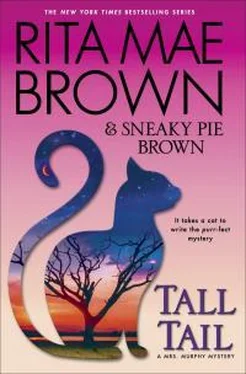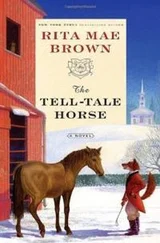She saw blood.
The thick woods rested on level ground that dipped down, eventually to a feeder creek. Much rock lay near the bottom. In some cases sheer rock faces loomed over narrow deer trails, unusual for this land, but common as one got into the Blue Ridge Mountains. Other places had flat rock beaches, or rocky sides and a few large boulders, like this area. A narrow trail followed the creek. One could travel it without detection. This portion eventually flowing into Ivy Creek was one of them.
Her senses alert, she followed the dog and followed the drops of blood. Piglet stopped near the hidden cave. Motionless, he pricked his ears. Catherine took his advice and stayed still, too.
She heard a moan, then Father Gabe’s voice. Catherine listened for what seemed a long time, then silently turned, headed back.
Back on higher land, she ran to the big house.
“Bettina!”
Having fallen asleep in the kitchen, Bettina startled, sat up straight.
“Bettina.” Catherine stepped into the room. “Something’s wrong.”
Just then, Ewing opened the kitchen door from the hall side. “Darling, Francisco’s been killed. Come into the office and I will tell you what I know. Weymouth!” He called out.
Weymouth appeared. “Yes, sir.”
“Go fetch Rachel, Charles, and John. Now.”
“Yes, sir.”
Ewing looked at his daughter. “I only want to tell this story once, but seeing you, I know I will tell it twice.” And so he did.
When the others finally gathered in the library, the tale now told, Rachel looked to her father and then to Catherine. They all knew one another inside and out.
“Father, do you want us to search?” Rachel asked.
“No, my dear. We leave this to the constable. If I were a runaway slave, I’d make for the river.”
No one said anything, but then John nudged forward another opinion. “Yes, sir, that would be the fastest way out of here, but it might be the first place people would look and I expect there are militia men or others on the river now.”
Ewing wrinkled his brow. “I suppose so. They’ll kill Moses. There will be a show of legality if they can even get him to the courthouse, but he will die.”
Not being an American and never facing such a situation, Charles asked, “What would happen to anyone who assists him or Ailee?”
Ewing exhaled loudly. “Up to the discretion of the judge, but even if a man was not accused of stealing another man’s property or helping a murderer, he would be ruined for life. Certainly he would have to leave Virginia.”
“Yes, yes, of course,” Charles replied in a low voice. “And where could such a person go? Every state has slaves.”
“There are some states which are talking about changing that,” said Catherine. “Vermont most especially, but I have heard Pennsylvania might be leaning that way.”
“It will ruin businessmen,” Ewing said.
“Not if it is done in stages, Father, which some people have suggested. It’s not a popular idea, but it is interesting, is it not, that a few people in a few places are thinking of such things?” Catherine added this as though of little consequence.
“I suppose.” Ewing folded his hands together across his middle. “The world is changing too fast for me. So many improvements, and then again, a falling away from the old ways. Such ideas will create turmoil.”
“Yes, they will,” John agreed.
Unbidden, Piglet came into the room. He stared right up at Catherine. They shared an enormous secret, a crushing burden.


Friday, July 29, 2016
“M e, Me, Me!” Pewter rolled around in the dirt by the barn, stopping to reveal way, way too much white tummy.
“I wouldn’t display that much fat if I were you,” Tucker yipped.
“I’m not you, Wormdog,” she hissed.
Holding a small boom with a sensitive mike, Deon Watts, the soundman, pleaded, “Is there any way to put up the animals?”
Harry, in a dark blue shirt in high contrast to her tall sunflowers, replied, “I can try, but they know the way in and out of everything. Let me see if persuasion will work.”
Rae Tait and Bethel Carson, the videographer, took a short break.
“Pewter, Tucker, shut up. If you don’t, this will be ugly and I’ll carry you back to the house and put you in the basement.”
Feeling Tucker was wrongfully chastised, Mrs. Murphy walked over to sit next to the dog.
“Brownie!” Pewter spat.
“Come on, Pewts, I don’t want to sit in the basement and neither do you.” Mrs. Murphy loathed the boring basement. Given their great hunting abilities, there weren’t any vermin in the basement to help pass the time.
Harry then tried her hand at direction. “If you shoot them there, together, then pan to the sunflowers, overlarge egos may be appeased. And then, of course, when we walk back to the barn, they’ll run ahead and that will make a good shot. Mrs. Murphy might even climb on a paddock fence and call to the horses. Never hurts to entertain a bit, does it?”
The three looked down at the animals, then to one another.
Rae shrugged. “Why not? If you can just keep them quiet. Let’s try this again. Take four.”
Ignoring the rising heat, Harry smiled at the camera. She turned away slightly, sweeping her hand toward the beautiful field of sunflowers. “This riot of color will be harvested in a few weeks, depending on rainfall and sunshine. The sunflowers will grow higher, the heads larger. No pesticides are used. The seeds are removed, placed in large sieves. We shake them out and divide by size once they are completely dried out. I’m surprised musicians don’t use the sound, softer than castanets but swishy.” She half giggled.
“Did she write this?” Pewter whispered.
“Shh.” Mrs. Murphy bumped Pewter, who sat on her haunches with Mrs. Murphy and Tucker.
Harry rattled on. The footage and soundtrack could all be edited down. From the sunflowers they shot footage of the Ambrosia corn and the Silver Queen, Harry explaining the difference in taste, the Ambrosia being sweeter. She discussed the types of pests, especially corn worms and blight. Corn spiders performed useful service against some of the pests, and she declared she lost about ten to fifteen percent of her annual harvest to damage because she refused to use pesticides. A few old pear trees were next, and Harry explained that she had no orchard but she wanted to keep some of the old varieties growing and healthy. She put her hand under a pear, large already.
“This is a Sewickly pear. Used to be acres of them in the forties and fifties, my dad said. Harder to grow, more susceptible to fungi and other things. They’ve been overtaken by Fuji pears and a few other types, all good, but we lose diversity.” She then walked to some appealing peaches, almost like a drawing, and continued, “These are Alverta peaches. The same story as the pears and”—she continued walking—“here are Black Twig apples.” She paused. “I don’t sell the fruit. I don’t have enough, but my friends and I use them, bake with them, and also can some. Each of these varieties has a distinctive taste, quite different from what you are accustomed to in supermarkets. I just don’t have the money or manpower to install a profitable orchard using the types from past centuries.”
“Cut.” Rae beamed. “This is fascinating. People will be interested. Can you tell me why this is important to all of us? Even though they are more difficult to grow, so to speak, what’s the payoff for the consumer?”
Читать дальше














